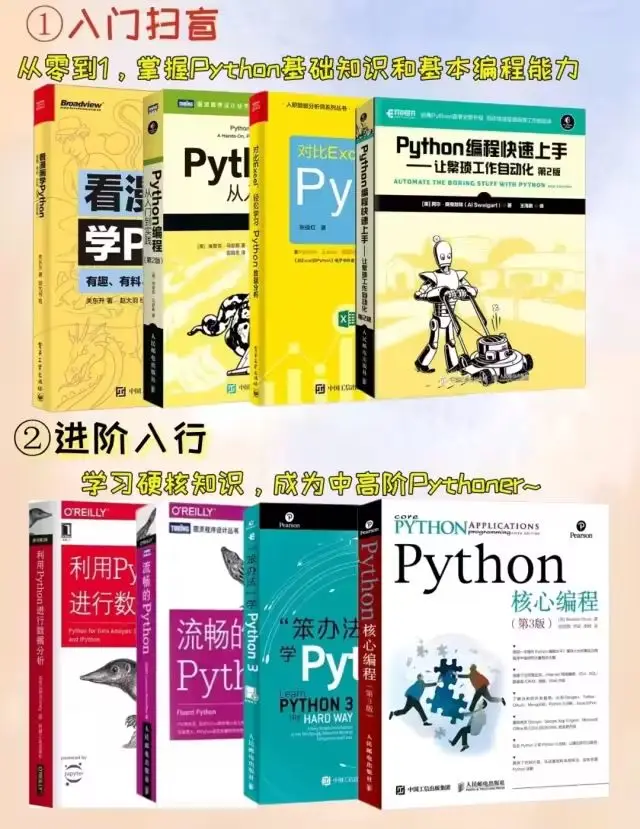
[Download materials at the end]
Python is a versatile language. It is often used as a scripting language for web applications, embedded in software products, as well as for artificial intelligence and system task management. It is both simple and powerful, making it perfect for beginners and professional programmers alike.
We have selected 51 high-quality Python books. They cover a wide range of topics, suitable for beginners, intermediate, and advanced programmers, including those focused on specific areas, such as writing Python games, which are highly regarded in the Python community… Most importantly, all the books are available for free download.
Let’s take a look at the list of books.
Core Python Programming Third Edition (Chinese Version)
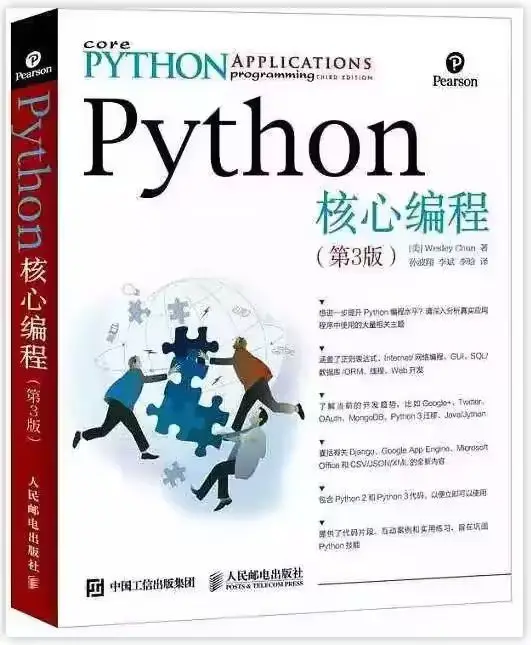
Core Python Programming PDF eBook
The PDF of Core Python Programming Third Edition (Chinese Version) is an advanced tutorial that includes regular expressions, network programming, database programming, GUI, Django, web scraping, cloud computing assumptions, etc. It is a must-have book for coding enthusiasts!
Python is a straightforward yet robust programming language. It possesses the powerful features and complexities of traditional compiled programming languages while also offering the ease of scripting and interpreted languages to some extent. This book introduces readers to the core aspects of the language and demonstrates what tasks Python can accomplish. Its main content includes: syntax and programming style, Python language objects, web programming, execution environment, etc. The book is well-organized and easy to understand, making it the best textbook and reference manual for learning Python. The attached CD includes the latest three versions of Python and example code from the book.
Python Learning Manual Fourth Edition (Chinese Version)
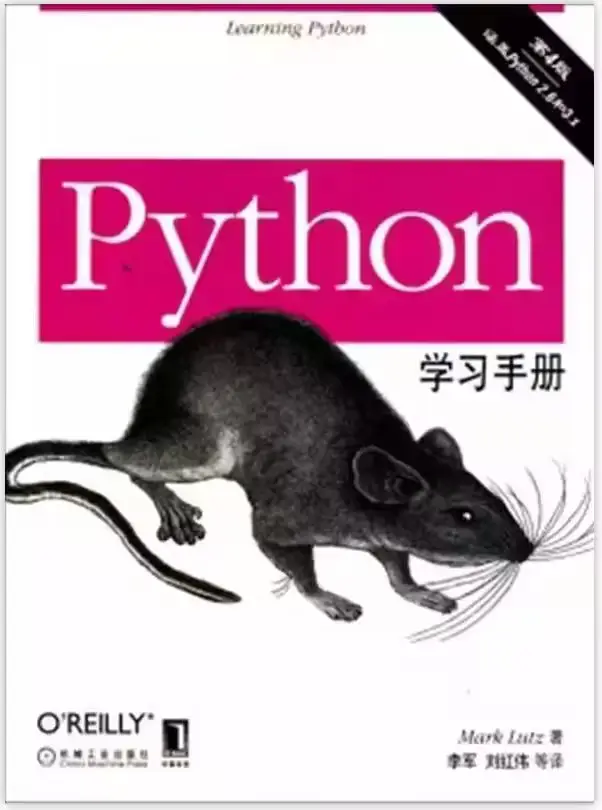
Google and YouTube have adopted Python due to its high adaptability, ease of maintenance, and suitability for rapid development. The “Python Learning Manual (Fourth Edition)” will help you write high-quality, efficient code that integrates easily with other languages and toolsets. This book is based on the renowned training course by Python expert Mark Lutz, making it easy to master and self-learn.
Each chapter of “Python Learning Manual (Fourth Edition)” elaborates on key aspects of the Python language, accompanied by chapter-end exercises to help you learn new skills and deepen your understanding. The book includes numerous annotated examples and diagrams that will aid you in easily learning Python 3.0.
“Python Learning Manual (Fourth Edition)” covers the main built-in object types of Python: numbers, lists, and dictionaries. It teaches you to create and manipulate objects using Python statements and learn the general syntax model of Python. You will learn to construct and reuse code using functions, which are fundamental tools in Python. The book covers Python modules: encapsulating statements, functions, and other tools to build larger components. It also introduces Python’s object-oriented programming tools for organizing program code, exception handling models, and development tools for writing larger programs. Advanced Python tools such as decorators, descriptors, metaclasses, and Unicode handling are also discussed.
Python Algorithm Tutorial
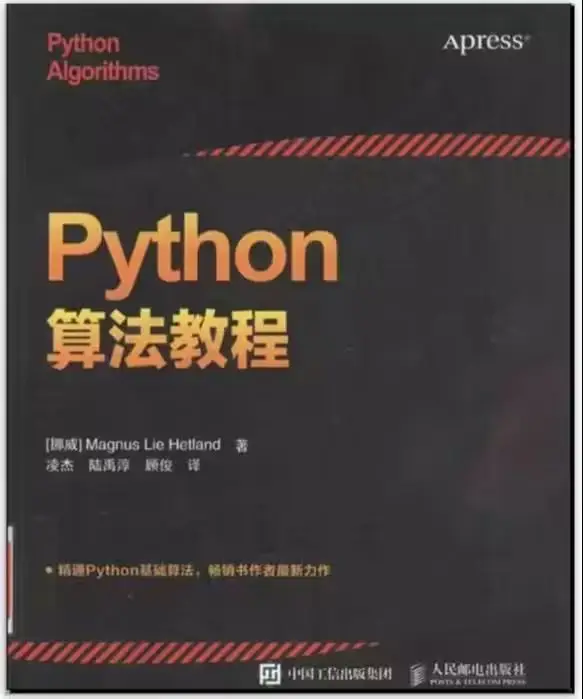
Python is an object-oriented, interpreted programming language with a wide range of applications, including data analysis, natural language processing, machine learning, scientific computing, and building recommendation systems.
The Python Algorithm Tutorial explains algorithm analysis and design using Python. The book primarily focuses on classic algorithms while providing a solid foundation for readers to understand fundamental algorithm problems and solutions. The book consists of 11 chapters, covering trees, graphs, counting problems, inductive recursion, traversal, divide and conquer, greedy algorithms, complex dependencies, Dijkstra’s algorithm, matching and cutting problems, and difficult problems and their dilution. Each chapter ends with exercises and references, providing convenience for self-checking and further learning. At the end of the book, hints for the exercises are provided to help readers fill in gaps in their understanding.
The concepts and knowledge points in this book are explained clearly and concisely. It is suitable for intermediate users interested in Python algorithms and can also serve as a reference textbook for computer science students in higher education.
First Python Introduction Book for Programming Beginners

To help more programming novices easily get started, this book combines efficient learning methods with core knowledge in Python. Flip through a few pages, and you will find that this book is different from other programming books. It includes a large number of visual scenes to help you understand concepts, interspersed with several interesting small projects. Most importantly, this book is designed for complete beginners.
Since ineffective methods cannot teach Python, we decided to use a smart approach to create shortcuts for learning. The core of this efficient learning method is:
1. Simplification: Learn the most essential key knowledge;
2. Understanding: Use analogy and visualization methods to comprehend this core knowledge;
3. Practice: After building your knowledge system, gradually refine it through practice.
Do not create a dictionary-style knowledge system; some programming books are like dictionaries, covering various details. Just as children should not learn Chinese with a dictionary, beginners should not learn programming with such thick books. In Chinese, mastering 1500-2000 common characters allows one to understand 80% of the text. Similarly, there are key knowledge areas in programming. Building your knowledge system with these key areas will accelerate learning efficiency, which is a better approach than diving into every detail from the start. This is the meaning of simplification.
Using Python for Web Scraping
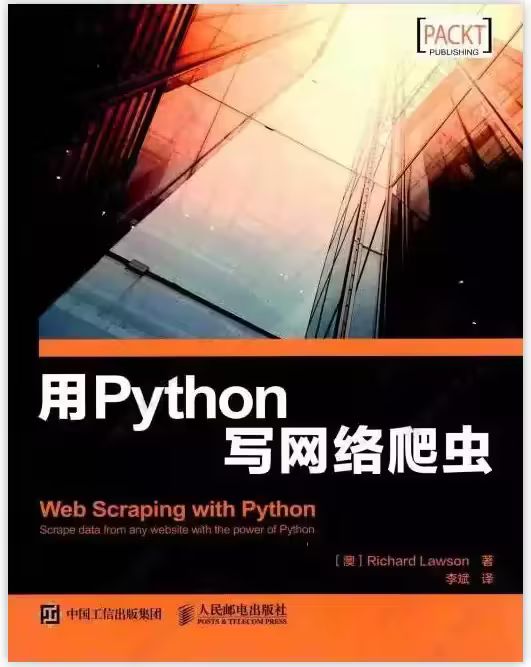
As a convenient way to collect information online and extract usable data, web scraping technology has become increasingly useful. Using a simple programming language like Python, you can scrape complex websites with minimal programming skills.
“Using Python for Web Scraping” serves as an outstanding guide for scraping web data using Python. It explains how to scrape data from static pages and manage server load using caching. Additionally, the book covers how to scrape data using AJAX URLs and Firebug extensions, as well as more truths about scraping techniques, such as using browser rendering, managing cookies, and extracting data from complex websites protected by CAPTCHAs through form submissions. This book creates an advanced web scraper using Scrapy and scrapes several real websites.
The book introduces the following content:
Scraping websites by following links;
Using lxml to extract data from pages;
Building threaded scrapers to scrape pages in parallel;
Caching downloaded content to reduce bandwidth consumption;
Parsing JavaScript-dependent websites;
Interacting with forms and sessions;
Solving CAPTCHA issues on protected pages;
Reverse engineering AJAX calls;
Creating advanced scrapers using Scrapy.
This book is written for developers who want to build reliable data scraping solutions, assuming the reader has some Python programming experience. Of course, readers with experience in other programming languages can also read this book and understand the concepts and principles involved. Are the five selected textbooks enough? If not, take a look at the dozens of Python learning materials below! These are all the treasures we have collected over the years…
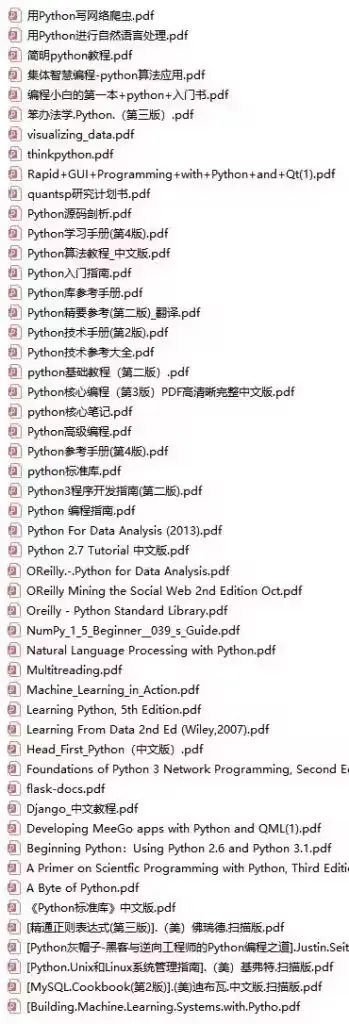
Recommended high-quality Python books:
1. “Think Python Like a Computer Scientist”
This book aims to cultivate readers to understand Python programming from a computer scientist’s perspective. It is a practical learning guide suitable for programmers without Python programming experience. The second edition has made many updates compared to the first edition, upgrading the programming language from Python 2 to Python 3.
2. “Dive Into Python 3”
This book is a practical guide to the Python language, starting each chapter with a real, complete piece of code, followed by explanations and analyses, and concluding with summaries. The content covers Python 3 and its differences from Python 2.
3. “Python Programming: An Introduction to Computer Science”
This book is a practical guide to Python programming, aimed at teaching readers not only the basics of the Python language but also how to apply this knowledge and skills through project practice.
4. “Fluent Python”
2017’s best advanced Python book, written by Luciano Ramalho, who has been in Python development for nearly 20 years, with technical reviewers including Python experts such as Victor Stinner and Alex Martelli. It analyzes programming details from the perspective of language design, covering both Python 3 and Python 2, explaining the causes and solutions to language traps that cannot be understood without hands-on practice, and teaching you to write idiomatic Python code.
5. “Python Cookbook (Chinese Edition)”
This book covers many common problems in Python applications and provides general solutions. It includes a wealth of practical programming tips and example code, making it very suitable for Python programmers with a certain programming foundation.
6. “Python Programming: From Beginner to Practice”
This book is designed for Python readers of all levels, combining theory and practice. The earlier sections cover basic knowledge, while the latter sections include practical projects to help you better apply this knowledge.
7. “Natural Language Processing with Python”
This book provides an easy-to-learn introduction to natural language processing, covering various language processing techniques from text and email filtering to automatic summarization and translation. It has been updated for Python 3 and NLTK 3, with plenty of examples and exercises to help you:
8. “Python Game Programming”
This book teaches Python programming through the creation of small, fun games, directly displaying the source code of the games and explaining the principles of programming through examples.

TodaywewillsharewitheveryonethematerialshereIfyouneedPython booksyoucancontactme~
How to Obtain:
Followtheauthorandreply:666togetthe,
OraddmedirectlyonWeChattoreceivethematerials